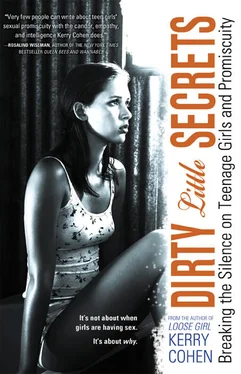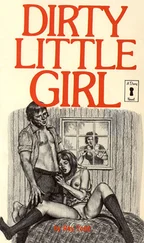Eighteen-year-old Niesha told me she only has sex when she’s drunk or high. For her, all the activities together are what she’s after. She likes the whole experience, the sense that she can get pulled out of her life, which currently has very little direction. Her parents made her move out the day she turned eighteen, and so she lives with a couple of friends in a tiny apartment. They all work in chain restaurants during the day, and at night they party. They invite some of the guys they work with, who bring fifths of liquor, cocaine, and pharmaceuticals, and they party until four or five in the morning. Invariably, one of the guys winds up in Niesha’s bed. It’s been a rotating cycle; she sleeps with whichever one gets there first. The next day she is always late for work, with a pit in her stomach about what happened the night before.
When I talked to her, she asked me whether I thought she had a drug and alcohol problem. I told her it sounded as though she were using a number of substances and situations to try to soothe something inside.
Of course, adolescence is a time of risk taking. Most adolescents use these years to experiment with their own boundaries, with what they can handle, and with identity. Promiscuity is, in many ways, a perfectly normal part of that experimentation. But as with substance use, because sexual behavior is stigmatized, many teens turn it into self-destructive behavior. When we see other types of self-harming behaviors in teenagers, we tend to also see sex used in negative ways. This is important, because it describes the difference between normative sex—normal sexual exploration—and sex used to harm oneself. {82} 82 8. It remains intensely difficult to untangle what really is standard or normal when the culture has determined for us already that no sex in any way is normal for a teen. Suddenly, the question of whether a behavior causes someone extreme distress—a typical psychologist’s question when determining whether behavior needs to be addressed—becomes doubtful: a girl may well feel tremendous shame about behavior that isn’t so horrible when that behavior is removed from cultural mores. We have to wonder whether the real trouble is the behavior or the labeling of the behavior as a problem.
In almost every email I receive from readers, girls ask me why they can know their behavior hurts them, and yet can’t seem to stop. They know they are having sex for the wrong reasons. They know they need something from it that they won’t actually get, that they are setting themselves up to feel even worse. There are many answers to why loose girls have trouble stopping the behavior, but an important one to consider is that the behavior is an addiction.
ADDICTION AND THE LOOSE GIRL
I’ve gotten some flak for using the word addiction attached to the idea of loose-girl behavior. While promoting Loose Girl , I gave a number of readings from the book with follow-up question-and-answer periods. Inevitably, there was one person in the audience who was unhappy with the fact that I’d suggested that being a loose girl was an addiction. One man said, “I almost died from my addiction. Did you?” Of course, I could have said defensively that I could have almost died from HIV or some STD. I could have died when, as a young girl, I put myself in danger by going off with strange men. But this isn’t really the point. That man in the audience was angry because he had surely seen a number of issues showing up lately as addictions: sex addiction, love addiction, relationship addiction. And perhaps he felt that calling these issues addictions took away from his own struggles with chemical addictions.
But these issues are rightfully addiction, too—they are not chemical addictions, no, but process addictions, which is an addiction to an activity as opposed to an addiction to something that is ingested. Process addictions include spending money, gambling, Internet use, and—you guessed it—sex and love. A person with a process addiction is after psychological gratification and will indulge in their “drug” of choice enough that he or she build up a sort of dependency. The danger of process addictions occurs when the activity gets in the way of one’s daily life functioning or leads a person to harm his or her body, as with eating disorders. Sex and love addictions are example of pseudorelationship addictions, a type of process addiction, which are so integrated into our society, often considered the norm, that it is tricky to decipher what is truly an experience of addiction and what is simply a bad relationship.
Perhaps it helps to define addiction. Craig Nakken, author of The Addictive Personality , defines addiction as an attempt to control the uncontrollable cycles we all experience in our lives. {83} 83 9. Craig Nakken, The Addictive Personality , 2nd ed. (Center City, MN: Hazelden Publishing, 1988).
We all experience loss and heartache. We all don’t get what we want plenty of times in our lives. But when a person uses a particular object, event, or another person to try to control how that feels, to produce a desired mood change, and when that person has to use this thing to feel better, that is addiction.
Those mood changes can also be thought of as intoxication. So when a sex addict experiences an uplifted mood while in a sex shop, that is a sex addict acting out her addiction. Or when a boy looks at a loose girl and smiles, and she winds up forgetting all the other plans she had for that evening so she can focus on making that boy hers, that is the loose girl acting out her addiction. The point that crosses this behavior over to addiction is the loose girl’s inability to attend to anything else in the face of feeding her desire. When her life has become unmanageable, to use the language of the twelve-step programs, when she has lost something that ultimately matters more to her, such as a long-term, loving relationship, a chance to have children, a career, she has entered into a phase we can frame as addiction. Or, perhaps put best, when she keeps doing it even though she really, really wants to stop, she has entered the world of addiction.
One way that loose girls are different from, say, girls who are just moving through a phase, or from girls who really want sex and are only troubled because it’s not accepted by society, is that loose girls know that what they are doing hurts them, but they can’t seem to stop. This is why I classify the behavior as addiction. This is where it is different from healthy sexual behavior. Loose girls don’t have sex for the right reasons, or at the least for reasons that will benefit them. They have sex to maintain the addiction, which is the same reason smokers keep smoking long after they want to quit or that pot smokers keep waking and baking long after they’ve decided their drug use isn’t working for them anymore.
Beth wrote to me after coming out of rehab for heroin use. She said her addictions to men and heroin are remarkably similar. If a man rejects her, she turns to heroin to get that good feeling back, and she has spent many months homeless and on the streets as a result. If she is off heroin, she man hunts to get the feeling back again. The pain she feels, she said, is so deep and awful that she cannot stay away from one or the other. She had two years of sobriety from both, after which she felt like she’d really done important work to move on.
She met a man she thought was different. But it turned out he was just like the others in her pattern. He was unavailable, unable to give her what she needed. He treated her like he cared for her, slept with her willingly, but said he wasn’t interested in more than friendship. So she wound up on the streets again for seven months. She slept with five random guys, feeling deep pain about the guy who sent her on a bender. She wants so badly to break free, to stop turning to things that hurt to try to get away from hurt. She recognizes the irony. She sees how irrational her behavior is. She knows, too, that she should never talk to that guy again, erase his number, stop answering his texts, but she can’t. She feels trapped in the cycles she’s built for herself because her only other option is terrible despair.
Читать дальше












